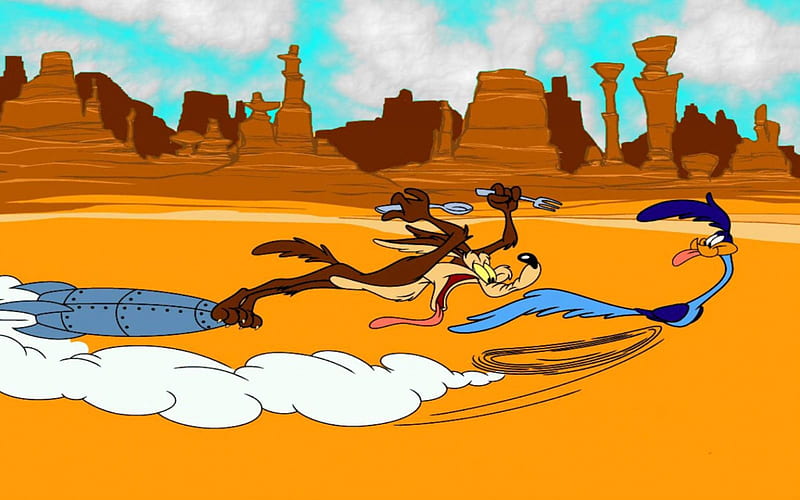- Chatting about Cartoons, Random Musings
Wile E Coyote and the Pursuit of Happiness
- March 6, 2022

I originally wrote this as a Quora answer, and decided it would work pretty well as a blog post too. So I expanded a bit on it, and here it is:
When I was a kid, I often watched the old Looney Tunes/Merrie Melodies cartoons. I also watched Tiny Toons and Animaniacs, cause I was a kid of the 90s, but the Looney Tunes were of course classics. And while I didn’t often laugh that hard at the cartoons, they never failed to entertain me. The shorts with the Roadrunner and Wile E Coyote weren’t my faves… I tended to prefer Daffy Duck, Bugs Bunny and Speedy Gonzales; characters who not only talked but had much more varied adventures. a Roadrunner cartoon is per definition the same plot every time: Coyote tries to catch Roadrunner and fails. You could take any gag from any Roadrunner cartoon and insert it into any other Roadrunner cartoon and, apart from how a few running gags might be disrupted, people probably wouldn’t even notice.
That’s not to say I didn’t like the Roadrunner cartoons. They were fun little collections of gags, and I happily watched for the six minutes the cartoon went on. occasionally giggling at the silly Coyote who never managed to catch his prey.
When I got a little older, and started interacting with people on the Internet, I was surprised to learn just how many people had watched the same cartoons and had a very different experience than me. Hundreds. if not thousands of people were singing the same chorus: “I just wanted the Coyote to catch that damn Roadrunner!”
I was baffled. For me, the part was to watch the Coyote FAIL, just as the fun part was to watch Elmer Fudd fail to shoot Bugs Bunny or to watch Sylvester fail to eat Tweety. Or, to use a less violent example, to watch Bert fail to get the peace and quiet he wants because Ernie is being cheerfully chaotic again. The comedy here hinges on the fact that one party (generally the antagonistic one) wants something and DOESN’T get it. I’ve written about this before, how desire is a driving force in a story and if a character doesn’t achieve their desire it’s either comedy or tragedy… and while I’d seen it as comedy in the case of the Roadrunner cartoons. lots of people were seeing it as tragedy.
I disagree. I say that the REAL tragedy would be if the Coyote actually caught the Roadrunner.
Let me explain.
One thing is that compared to Bugs or Tweety or even Ernie, the Roadrunner doesn’t do anything to add to the antagonism between him and the Coyote. If the Coyote left him alone, he’d leave the Coyote alone. He’d just go on running without a care in the world. If Sylvester gave up hunting Tweety, Tweety might try to provoke him into taking the chase back up because Tweety’s kind of a jerk. But the Roadrunner, for the most part, barely seems to notice the Coyote is even there… when he does notice, with a very few exceptions the most he does is run away from him… or startle him with a well-timed “Meep-meep!” that causes the Coyote’s plan to backfire for the umpteenth time, and that’s clearly self-defense. Even the very few times where he does something a little more active in fighting back, it’s generally after the Coyote has been hounding him for the entire cartoon… and he’s not even angry or vengeful about it, he just delivers the punch with a friendly smile and then goes on his way. The Roadrunner is really an innocent in all this; he doesn’t have much of a personality but he’s certainly among the LEAST confrontational Looney Tunes.
Another thing is that the Coyote is the instigator, and for the most part he’s his own worst enemy. He makes all sorts of plans, both simple and complicated, and sometimes OVER-complicated, in order to catch the Roadrunner. Sometimes the plans go against the original intention of getting a Roadrunner dinner; some of the murder attempts are so destructive that there wouldn’t be enough left of the Roadrunner to even make for a mouthful…
…of course, this does assume that the murder attempts would even work.
I mean, when the plans inevitably backfire and the Coyote is the one who suffers the fate he’d intended for the Roadrunner, he always lives… he gets blown up, flattened, falls from incredible heights, shot, run over by trucks and trains, but he always lives… come the next scene, he’s back on his feet without a scratch. Who’s to say the Roadrunner wouldn’t be just as immortal? In which case, of course, the chase is doubly pointless because the Coyote could never kill the Roadrunner anyway, and you’d think he’d eventually come to the conclusion that he’d be better off if he just forgot the chase and just went out for pizza instead.
In that way, his failures are just karma.
But of course, that’s the thing about the Coyote; he’s obsessed. The Roadrunner cartoons are like a study in obsession… it all BEGAN with the Coyote just wanting a quick (hee) meal, but he kept failing to catch that darn bird and got more and more stubborn about it.
Failing once or twice? Okay, happens to the best of us, try again.
Failing ten times? Well, he’s definitely dedicated to this.
Failing fifty times? He really should start rethinking his priorities.
Failing five hundred times? He’s obsessed.
He no longer remembers why he’s even chasing the Roadrunner or what he would even do if he succeeded. He keeps making pointless plans that are doomed to fail, and the thing is that he COULD stop any time he wants. But of course he doesn’t, because he’s obsessed. And because maybe, just maybe, he knows deep down that after so many attempts, actually catching the Roadrunner would be a disappointing anticlimax. No matter how spectacular the victory was, it would never live up to expectations…
And the victory wouldn’t even be spectacular. I’ll get back to why in a moment.
When I was a kid, I immediately grasped this. The Roadrunner cartoons weren’t about the Coyote working towards a goal that was possible to achieve. They were about constant repeat failures, and the comedy came from a mix of predictability and unpredictability: You knew the Coyote would fail, but you didn’t know HOW he would fail. Chuck Jones was good with fulfilling expectations and subverting them at the same time… not to mention, he was a MASTER of the cartoonish expressions. Look at the Coyote’s body language and facial expressions; often the funniest part isn’t the moment when the plan fails, but the Coyote’s expression as he realizes, just a second too late to do anything about it, just how he’s ABOUT to fail.
Even as a kid, I knew that if he actually managed to catch the Roadrunner, it wouldn’t be funny or entertaining. As I grew older and discovered all those parodies and “homages” where the Coyote succeeds in catching and eating the Roadrunner, I knew my kid self had been right… because the thing all those parodies have in common is that they’re PAINFULLY unfunny. We’re talking Seth McFarlane levels of unfunny. (Seth McFarlane did do one of those parodies, in fact, and it was just as badly-timed, drawn-out, and boring as most of his stuff.) This is what I meant when I said that his victory could never be spectacular, because in those parodies it never is. It’s always dreary, uncreative and anticlimactic.
I suppose people who sympathize with the Coyote might find them cathartic, but really a lot of them just end up as tragedies anyway because they show how empty and meaningless the Coyote’s life is without his obsession. And I don’t know about you, but watching a murderer falling into depression and eventually committing suicide isn’t my idea of comedy gold. Black comedy is one thing, but it does need, well, some actual comedy.
So either the cartoon stops at the death of the Roadrunner, which is abrupt and unsatisfying, or it goes on to show the logical conclusion (the Coyote discovering his life is meaningless and falling into depression), which is about as funny as a fire at an orphanage. There really is no way to give this a satisfying ending.
This is why the Coyote’s victory would be a tragedy and not a triumph.
But I think we can take it a little bit further: It’s the fact that the Coyote always fails that KEEPS his life from being a tragedy. It’s easy enough to view him as a tragic figure, pointlessly striving for a goal he can never reach and which wouldn’t bring him happiness even if he did reach it.
Here’s the thing, though: It might seem like a paradox, but the Coyote can only ever be happy if he doesn’t win. Because happiness for him comes in the developing of his plans, the challenges to his intellect and his creativity. Look at how gleefully he smiles when working out his next plan, or how happy he is imagining the Roadrunner’s demise… If he succeeded, that would all be gone. To quote Neil Gaiman: “The price of getting what you want is having what you once wanted.” No victory could ever bring the Coyote as much happiness as the chase does.
Hence, the Roadrunner shorts ONLY work BECAUSE the Coyote always fails. The moment he succeeds, he stops being funny… what’s more, the moment he succeeds. there is no longer any point to his character or to his life. The chase is the what gives him meaning.
So don’t grieve for Wile E Coyote. He may suffer a lot of mishaps, but he always bounces back. And he always bounces back because, every single day, he’s doing what he loves. In his own way, he’s found happiness.

